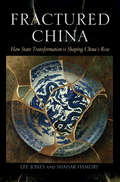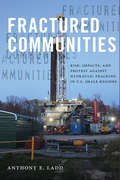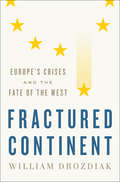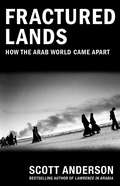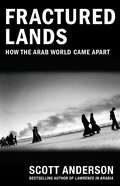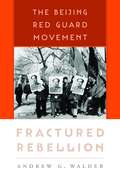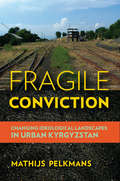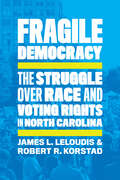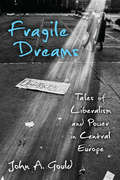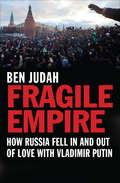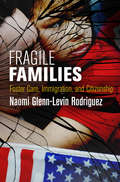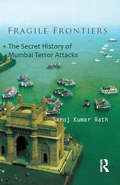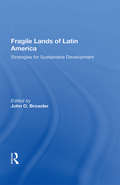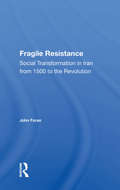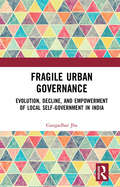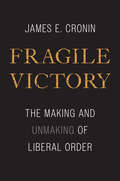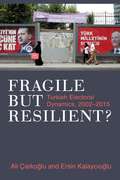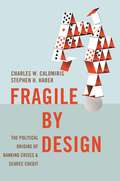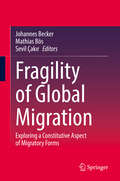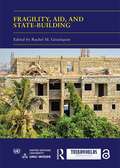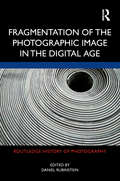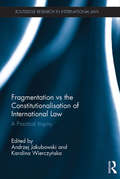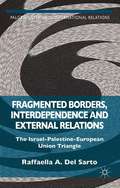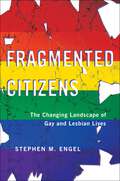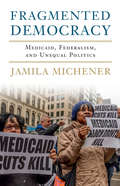- Table View
- List View
Fractured China: How State Transformation Is Shaping China's Rise
by Shahar Hameiri Lee JonesIs China's rise a threat to international order? Fractured China shows that it depends on what one means by 'China', for China is not the monolithic, unitary actor that many assume. Forty years of state transformation – the fragmentation, decentralisation and internationalisation of party-state apparatuses – have profoundly changed how its foreign policy is made and implemented. Today, Chinese behaviour abroad is often not the product of a coherent grand strategy, but results from a sometimes-chaotic struggle for power and resources among contending politico-business interests, within a surprisingly permissive Chinese-style regulatory state. Presenting a path-breaking new analytical framework, Fractured China transforms the central debate in International Relations and provides new tools for scholars and policymakers seeking to understand and respond to twenty-first century rising powers. Drawing on extensive fieldwork in China and Southeast Asia, it includes three major case studies – the South China Sea, non-traditional security cooperation, and development financing–to demonstrate the framework's explanatory power.
Fractured Communities: Risk, Impacts, and Protest Against Hydraulic Fracking in U.S. Shale Regions (Nature, Society, and Culture)
by Peter Hall Stephanie A. Malin Suzanne Staggenborg Anthony E. Ladd Hilary Boudet Sherry Cable Brittany Gaustad James Maples Tamara Mix Carmel Price Dakota K.T. Raynes Stacia Ryder Trang Tran Ion Bogdan Vasi Cameron Thomas Whitley Patricia WidenerWhile environmental disputes and conflicts over fossil fuel extraction have grown in recent years, few issues have been as contentious in the twenty-first century as those surrounding the impacts of unconventional natural gas and oil development using hydraulic drilling and fracturing techniques—more commonly known as “fracking”—on local communities. In Fractured Communities, Anthony E. Ladd and other leading environmental sociologists present a set of crucial case studies analyzing the differential risk perceptions, socio-environmental impacts, and mobilization of citizen protest (or quiescence) surrounding unconventional energy development and hydraulic fracking in a number of key U.S. shale regions. Fractured Communities reveals how this contested terrain is expanding, pushing the issue of fracking into the mainstream of the American political arena.
Fractured Continent: Europe's Crises And The Fate Of The West
by William DrozdiakA Financial Times Best Political Book of 2017 An urgent examination of how the political and social volatility in Europe impacts the United States and the rest of the world. The dream of a United States of Europe is unraveling in the wake of several crises now afflicting the continent. The single Euro currency threatens to break apart amid bitter arguments between rich northern creditors and poor southern debtors. Russia is back as an aggressive power, annexing Crimea, supporting rebels in eastern Ukraine, and waging media and cyber warfare against the West. Marine Le Pen’s National Front won a record 34 percent of the French presidential vote despite the election of Emmanuel Macron. Europe struggles to cope with nearly two million refugees who fled conflicts in the Middle East and North Africa. Britain has voted to leave the European Union after forty-three years, the first time a member state has opted to quit the world’s leading commercial bloc. At the same time, President Trump has vowed to pursue America First policies that may curtail U.S. security guarantees and provoke trade conflicts with its allies abroad. These developments and a growing backlash against globalization have contributed to a loss of faith in mainstream ruling parties throughout the West. Voters in the United States and Europe are abandoning traditional ways of governing in favor of authoritarian, populist, and nationalist alternatives, raising a profound threat to the future of our democracies. In Fractured Continent, William Drozdiak, the former foreign editor of The Washington Post, persuasively argues that these events have dramatic consequences for Americans as well as Europeans, changing the nature of our relationships with longtime allies and even threatening global security. By speaking with world leaders from Brussels to Berlin, Rome to Riga, Drozdiak describes the crises. the proposed solutions, and considers where Europe and America go from here. The result is a timely character- and narrative-driven book about this tumultuous phase of contemporary European history.
Fractured Lands: How the Arab World Came Apart
by Scott AndersonThe catastrophic story of how the Arab world has descended into chaos since the 2003 invasion of Iraq as told by the National Book Critics Circle Award finalist and international bestselling author of Lawrence in Arabia, a probing and insightful work of reportage.From world-renowned war correspondent, Scott Anderson, comes this gripping, human account of the unraveling of the Arab world, the rise of ISIS, and the global refugee crisis after the United States invasion of Iraq in 2003. Thisportrait of the region is framed by the stories of six individuals--the matriarch of a dissident Egyptian family, a Libyan Air Force cadet with divided loyalties, an Iraqi day-laborer turned ISIS fighter, a Kurdish doctor on leave from his practice to fight ISIS, a college student caught in the chaos of Aleppo, and an Iraqi women's rightsactivist targeted by militias. Through these personal stories, the myriad, complex causes of the widespread war and instability in the region come into focus and the concrete reality of the unspeakable tragedies occurring in the Middle East becomes clear.
Fractured Lands: How the Arab World Came Apart
by Scott AndersonFrom the bestselling author of Lawrence in Arabia, a piercing account of how the contemporary Arab world came to be riven by catastrophe since the 2003 United States invasion of Iraq.In 2011, a series of anti-government uprisings shook the Middle East and North Africa in what would become known as the Arab Spring. Few could predict that these convulsions, initially hailed in the West as a triumph of democracy, would give way to brutal civil war, the terrors of the Islamic State, and a global refugee crisis. But, as New York Times bestselling author Scott Anderson shows, the seeds of catastrophe had been sown long before. In this gripping account, Anderson examines the myriad complex causes of the region’s profound unraveling, tracing the ideological conflicts of the present to their origins in the United States invasion of Iraq in 2003 and beyond. From this investigation emerges a rare view into a land in upheaval through the eyes of six individuals—the matriarch of a dissident Egyptian family; a Libyan Air Force cadet with divided loyalties; a Kurdish physician from a prominent warrior clan; a Syrian university student caught in civil war; an Iraqi activist for women’s rights; and an Iraqi day laborer-turned-ISIS fighter. A probing and insightful work of reportage, Fractured Lands offers a penetrating portrait of the contemporary Arab world and brings the stunning realities of an unprecedented geopolitical tragedy into crystalline focus.
Fractured Rebellion: The Beijing Red Guard Movement
by Andrew G. WalderFractured Rebellion is the first full-length account of the evolution of China’s Red Guard Movement in Beijing, the nation’s capital, from its beginnings in 1966 to its forcible suppression in 1968. Andrew Walder combines historical narrative with sociological analysis as he explores the radical student movement’s crippling factionalism, devastating social impact, and ultimate failure. Most accounts of the movement have portrayed a struggle among Red Guards as a social conflict that pitted privileged “conservative” students against socially marginalized “radicals” who sought to change an oppressive social and political system. Walder employs newly available documentary evidence and the recent memoirs of former Red Guard leaders and members to demonstrate that on both sides of the bitter conflict were students from comparable socioeconomic backgrounds, who shared similar—largely defensive—motivations. The intensity of the conflict and the depth of the divisions were an expression of authoritarian political structures that continued to exert an irresistible pull on student motives and actions, even in the midst of their rebellion. Walder’s nuanced account challenges the main themes of an entire generation of scholarship about the social conflicts of China’s Cultural Revolution, shedding light on the most tragic and poorly understood period of recent Chinese history.
Fragile Conviction: Changing Ideological Landscapes in Urban Kyrgyzstan
by Mathijs PelkmansHow do specific secular and religious ideologies—such as nationalism, neoliberalism, atheism, Pentecostalism, Tablighi Islam, and shamanism—gain popularity and when do they lose traction? To answer these questions, Mathijs Pelkmans critically examines the trajectories of a range of ideologies as they move into the post-Soviet frontier in Central Asia. Ethnographically rooted in the everyday life of a former mining town in southern Kyrgyzstan, Fragile Conviction shows how residents have dealt with the existential and epistemic crises that arose after the collapse of the Soviet Empire. Residents became enchanted by the truths of Muslim and Christian missionaries, embraced the teachings of neoliberal and nationalist ideologues, and were riveted by the visions of shamanic healers. But no matter how much enthusiasm and hope these ideas first engendered, the commitment to any of them rarely lasted very long.Pelkmans finds that there is an inverse relationship between the tenacity and the effervescence of collective ideas, between their strength to persist and their ability to trigger committed action. Introducing the concept of pulsation, he argues in Fragile Conviction that ideational power must be understood in relation to three aspects: the voicing of the idea, its tension with everyday reality, and its reverberation within groups of listeners. The conclusion that the power of conviction is rooted in the instability of sociocultural contexts is a message that has relevance far beyond urban Central Asia.
Fragile Democracy: The Struggle over Race and Voting Rights in North Carolina
by Robert R. Korstad James L. LeloudisAmerica is at war with itself over the right to vote, or, more precisely, over the question of who gets to exercise that right and under what circumstances. Conservatives speak in ominous tones of voter fraud so widespread that it threatens public trust in elected government. Progressives counter that fraud is rare and that calls for reforms such as voter ID are part of a campaign to shrink the electorate and exclude some citizens from the political life of the nation.North Carolina is a battleground for this debate, and its history can help us understand why--a century and a half after ratification of the Fifteenth Amendment--we remain a nation divided over the right to vote. In Fragile Democracy, James L. Leloudis and Robert R. Korstad tell the story of race and voting rights, from the end of the Civil War until the present day. They show that battles over the franchise have played out through cycles of emancipatory politics and conservative retrenchment. When race has been used as an instrument of exclusion from political life, the result has been a society in which vast numbers of Americans are denied the elements of meaningful freedom: a good job, a good education, good health, and a good home. That history points to the need for a bold new vision of what democracy looks like.
Fragile Dreams: Tales of Liberalism and Power in Central Europe
by John GouldIn Fragile Dreams, John A. Gould examines Central European communism, why it failed, and what has come since. Moving loosely chronologically from 1989 to the present, each chapter focuses on topics of importance to the fields of comparative politics, sociology, and feminist and gender studies. He draws heavily from his own research and experience as well as case studies of the former Czechoslovakia, Western Balkans, and Hungary—but much of the analysis has general applicability to the broader postcommunist region. Broad in its coverage, this academically rigorous book is ideal for students, travelers, and general readers. Gould writes in the first person and seamlessly blends theory with stories both from the existing literature and from 30 years of regional personal experience with family and friends. Throughout, Gould introduces key concepts, players, and events with precise definitions. Wherever possible, he emphasizes marginalized narratives, centering theory and stories that are often overlooked in standard comparative political science literature.
Fragile Empire: How Russia Fell In and Out of Love with Vladimir Putin
by Ben Judah&“A beautifully written and very lively study of Russia that argues that the political order created by Vladimir Putin is stagnating&” (Financial Times). From Kaliningrad on the Baltic to the Russian Far East, journalist Ben Judah has traveled throughout Russia and the former Soviet republics, conducting extensive interviews with President Vladimir Putin&’s friends, foes, and colleagues, government officials, business tycoons, mobsters, and ordinary Russian citizens. Fragile Empire is the fruit of Judah&’s thorough research: A probing assessment of Putin&’s rise to power and what it has meant for Russia and her people. Despite a propaganda program intent on maintaining the cliché of stability, Putin&’s regime was suddenly confronted in December 2011 by a highly public protest movement that told a different side of the story. Judah argues that Putinism has brought economic growth to Russia but also weaker institutions, and this contradiction leads to instability. The author explores both Putin&’s successes and his failed promises, taking into account the impact of a new middle class and a new generation, the Internet, social activism, and globalization on the president&’s impending leadership crisis. Can Russia avoid the crisis of Putinism? Judah offers original and up-to-the-minute answers. &“[A] dynamic account of the rise (and fall-in-progress) of Russian President Vladimir Putin.&” —Publishers Weekly &“[Judah] shuttles to and fro across Russia&’s vast terrain, finding criminals, liars, fascists and crooked politicians, as well as the occasional saintly figure.&” —The Economist &“His lively account of his remote adventures forms the most enjoyable part of Fragile Empire, and puts me in mind of Chekhov&’s famous 1890 journey to Sakhalin Island.&” —The Guardian
Fragile Families: Foster Care, Immigration, and Citizenship (Pennsylvania Studies in Human Rights)
by Naomi RodriguezIn the past decade, debates over immigrant rights and family rights, and accompanying concerns over birthright citizenship, have taken center stage in popular media and mainstream political debates. These debates, however, frequently overlook the role of the public child welfare system in the United States—the agency charged with protecting children and maintaining the integrity of families. <P><P> Based on research conducted in the San Diego-Tijuana region between 2008 and 2012, Fragile Families tells the stories of children, parents, social workers, and legal actors enmeshed in the child welfare system, and sheds light on the particular challenges faced by the children of detained and deported non-U.S. citizen parents who are simultaneously caught up in the immigration system in this border region. <P><P>Many families come into contact with child welfare services because of the precariousness of their lives—unsafe housing, unstable employment, and the conditions of violence, drug use, and domestic violence made visible by the heightened police presence in impoverished communities. Naomi Glenn-Levin Rodriguez examines the character of child welfare decision-making processes and how discretionary decisions constitute the central avenue through which race, citizenship, and other cultural processes inflect child welfare practice in a manner that disproportionately impacts Latina/o families—both undocumented and U.S. citizens. <P><P>Drawing on ethnographic fieldwork to look at how immigration enforcement and child welfare play central roles in the ongoing production of citizenship, race, and national belonging, Fragile Families focuses on the everyday experiences of Latina/o families whose lives are shaped at the nexus of child welfare services and immigration enforcement.
Fragile Frontiers: The Secret History of Mumbai Terror Attacks
by Saroj Kumar RathCritical questions remain unanswered on the events of the cold-blooded and devastating terror attacks in Mumbai on 26 November 2008. Investigative and introspective, this book offers a lucid and graphic account of the ill-fated day and traces the changing dynamics of terror in South Asia. Using new insights, it explores South Asia’s regional dynamics of antagonism, the ever-present challenge to the frontiers of India, Pakistan and the terrorism question, the strife in Afghanistan and the self-serving selective US ‘war on terror’. This will be an engaging read for those interested in defence, security and strategic studies, politics, international relations, peace and conflict studies, and South Asian studies as well as the general reader.
Fragile Lands Of Latin America: Strategies For Sustainable Development
by John O. BrowderThis book of selected research papers, originally presented at the "Symposium of Fragile Lands of Latin America—The Search for Sustainable Uses," presents some fresh evidence of the viability of a few "non-conventional" strategies for natural resource development and management.
Fragile Resistance: Social Transformation In Iran From 1500 To The Revolution
by John ForanThis book analyzes the processes of social transformation in Iran from the height of the country's power in the sixteenth and seventeenth centuries under the Safavid dynasty to the aftermath of the startling revolution that overthrew the Pahlavi monarchy in 1979.
Fragile Urban Governance: Evolution, Decline, and Empowerment of Local Self-Government in India
by Gangadhar JhaUrbanization is giving rise to a vibrant and volatile urban India. The urban local self-government (ULSG) is struggling to provide efficient, effective, inclusive and responsive urban services. Most ULSGs are too fragile to perform the mandated functions for enhancing the quality of life and making cities and towns livable. The book traces evolution of ULSGs, its decline after Independence, and steps taken to strengthen them, especially through the big-bang decentralization initiative of 1992 for their empowerment, by enacting the 74th Constitution Amendment Act (74th CAA). Analyzing facets of the decentralization initiative, views of two review Commissions, policy responses to it and processes for implementation of constitutional provisions, it alludes to conspicuous gaps at three levels such as (i) gaps and deficiencies in the 74th CAA (ii) gaps in the post-74th CAA municipal Acts that were required to conform to the constitutional provisions, and (iii) gaps due to half-hearted implementation of even the mandatory constitutional provisions. Empowerment and strengthening of ULSG being in the nature of an imperative, it explores plausible options within the constitutional autonomy of states. Empowerment denotes authority, power and clarity in municipal functional and fiscal domain. Therefore it also specifies experiential based rational framework and a strategy for strengthening ULSGs that must look beyond the existing predilection for mere training. It fills an existing void in ULSG literature on the subject. Please note: Taylor & Francis does not sell or distribute the Hardback in India, Pakistan, Nepal, Bhutan, Bangladesh and Sri Lanka
Fragile Victory: The Making and Unmaking of Liberal Order
by James E. CroninHow the history of liberal order and democratic politics since the 1930s explains ongoing threats to democracy and international order The liberal democratic order that seemed so stable in North America and Western Europe has become precarious. James E. Cronin argues that liberalism has never been secure and that since the 1930s the international order has had to be crafted, redeployed, and extended in response to both victories and setbacks. Beginning with the German and Japanese efforts in the 1930s to establish a system based on empire, race, economic protectionism, and militant nationalism, Cronin shows how the postwar system, established out of a revulsion at the ideas of fascism, repeatedly reinvented itself in the face of the Cold War, anticolonial insurgencies, the economic and political crises of the 1970s, the collapse of communism, the rise of globalization, and the financial crisis of 2008. Cronin emphasizes the links between internal and external politics in sustaining liberal order internationally and the domestic origins and correlates of present difficulties. Fragile Victory provides the context necessary to understand such diverse challenges as the triumph of Brexit, the election of Trump, the rise of populism, and the Russian invasion of Ukraine.
Fragile but Resilient?: Turkish Electoral Dynamics, 2002-2015
by Ersin Kalaycioglu Ali CarkogluErsin Kalaycioglu and Ali Çarkoglu, who conducted surveys comparable to the American National Election Survey for the 2002 and 2015 national elections in Turkey, chart the dynamics that brought the pro-Islamist conservative Justice and Development Party (Adalet ve Kalkinma Partisi-AKP) to power in 2002, and that continue to influence electoral politics. The authors trace the uneven course of democratization in Turkey, as revealed through elections, since the first competitive, multi-party elections in 1950. Since the market liberalization reforms of 1980, Turkey has been rapidly evolving from a closed, agricultural, comparatively underdeveloped polity into an open and industrial state primarily integrated with the global economy. Kalaycioglu and Çarkoglu analyze different dimensions of five elections surveys in 2002-2015 period to show how the consequent socio-economic changes and traditional socio-cultural divisions have affected elections, political parties, and individual voters. The authors conclude that the historical-cultural divide between rural, peripheral, conservative groups and more urban, centrist, and modernized groups not only persists but shapes elections more than ever. This book not only provides an original comprehensive and critical evaluation of the Turkish electoral and party politics, it also offers a case study of voting behavior in a state undergoing both democratization and market liberalization in a rapidly changing and volatile international environment.
Fragile by Design: The Political Origins of Banking Crises and Scarce Credit (The Princeton Economic History of the Western World #50)
by Charles W. Calomiris Stephen HaberWhy stable banking systems are so rareWhy are banking systems unstable in so many countries—but not in others? The United States has had twelve systemic banking crises since 1840, while Canada has had none. The banking systems of Mexico and Brazil have not only been crisis prone but have provided miniscule amounts of credit to business enterprises and households.Analyzing the political and banking history of the United Kingdom, the United States, Canada, Mexico, and Brazil through several centuries, Fragile by Design demonstrates that chronic banking crises and scarce credit are not accidents. Calomiris and Haber combine political history and economics to examine how coalitions of politicians, bankers, and other interest groups form, why they endure, and how they generate policies that determine who gets to be a banker, who has access to credit, and who pays for bank bailouts and rescues.Fragile by Design is a revealing exploration of the ways that politics inevitably intrudes into bank regulation.
Fragility of Global Migration: Exploring a Constitutive Aspect of Migratory Forms
by Mathias Bös Johannes Becker Sevil ÇakırThis book demonstrates the analytical power of the concept of fragility as a central and defining aspect of global migration processes. To this end, the book brings together authors from the Americas, South Asia, the Middle East, and Europe, fostering a global dialogue on the social structuring of migration fragility in and between the Global North and the Global South. The various chapters of the book focus on two aspects. First, it discusses the multiplicity of the migrant as a social figure. There is not just one type of migrant, but a multiplicity of different fragile configurations that lead to the migrantization of people. Secondly, the same applies to the process of migration itself. There is a plethora of different articulations of fragility in crossing borders and organizing a new life somewhere else. Both perspectives show that the fragility of migration is not an aberration from &“normality&”. Fragility is an intrinsic part of the stabilization of social inequalities of migration between different migrants and different countries and regions of the globe. As such, this book is an important resource for researchers and students interested in the study of migration processes.
Fragility, Aid, and State-building: Understanding Diverse Trajectories (ThirdWorlds)
by Rachel M GisselquistFragile states pose major development and security challenges. Considerable international resources are therefore devoted to state-building and institutional strengthening in fragile states, with generally mixed results. This volume explores how unpacking the concept of fragility and studying its dimensions and forms can help to build policy-relevant understandings of how states become more resilient and the role of aid therein. It highlights the particular challenges for donors in dealing with ‘chronically’ (as opposed to ‘temporarily’) fragile states and those with weak legitimacy, as well as how unpacking fragility can provide traction on how to take ‘local context’ into account. Three chapters present new analysis from innovative initiatives to study fragility and fragile state transitions in cross-national perspective. Four chapters offer new focused analysis of selected countries, drawing on comparative methods and spotlighting the role of aid versus historical, institutional and other factors. It has become a truism that one-size-fits-all policies do not work in development, whether in fragile or non-fragile states. This is should not be confused with a broader rejection of ‘off-the-rack’ policy models that can then be further adjusted in particular situations. Systematic thinking about varieties of fragility helps us to develop this range, drawing lessons – appropriately – from past experience. This book was originally published as a special issue of Third World Quarterly, and is available online as an Open Access monograph at https://www.taylorfrancis.com/books/e/9781351630337.
Fragmentation of the Photographic Image in the Digital Age (Routledge History of Photography)
by Daniel RubinsteinFragmentation of the Photographic Image in the Digital Age challenges orthodoxies of photographic theory and practice. Beyond understanding the image as a static representation of reality, it shows photography as a linchpin of dynamic developments in augmented intelligence, neuroscience, critical theory, and cybernetic cultures. Through essays by leading philosophers, political theorists, software artists, media researchers, curators, and experimental programmers, photography emerges not as a mimetic or a recording device but simultaneously as a new type of critical discipline and a new art form that stands at the crossroads of visual art, contemporary philosophy, and digital technologies.
Fragmentation vs the Constitutionalisation of International Law: A Practical Inquiry (Routledge Research in International Law)
by Andrzej Jakubowski Karolina WierczyńskaThe current system of international law is experiencing profound transformations. Indeed, the simultaneous processes of globalization combined with the disintegration of international systems of governance and law-making pose complex challenges for legal scholarship. The doctrinal response to these challenges has been theorized within two seemingly contradictory discourses in international law: fragmentation and constitutionalisation. This book takes an innovative approach to international law, viewing the processes of the fragmentation and constitutionalisation as being profoundly interconnected and reflective of each other. It brings together a select group of contributors, including both established and emerging scholars and practitioners, in order to explore the ways in which the problems of fragmentation and constitutionalisation are viscerally linked one to the other and thus mutually conditioning and stimulating. The book considers the theory and practice of international law looking at the two phenomena in relation to the various fields of international law such as international criminal law, cultural heritage law and international environmental law.
Fragmented Borders, Interdependence and External Relations
by Raffaella A. Del SartoThis edited volume investigates the complex relations between Israel, the Palestinian territories and the European Union. They are considered as three entities that are linked to each other through various policies, bonds and borders, with relations between any two of the three parties affecting the other side. The contributors to this study explore different aspects of Israeli-Palestinian-European Union interconnectedness, including security cooperation; the movement of people; trade relations; information and telecommunication technology; legal borders defining different areas of jurisdiction; and normative borders in the context of conflict resolution and international law. By assessing the rules and practices that establish a web of interlocking functional and legal borders across this space, together with their implications, this volume adopts a novel perspective and sheds light on the complex patterns of interdependence and power asymmetries that exist across these fragmented borderlands.
Fragmented Citizens: The Changing Landscape of Gay and Lesbian Lives
by Stephen M. EngelA sweeping historical and political account of how our present-day policy debates around citizenship and equality came to beThe landmark Supreme Court decision in June 2015 legalizing the right to same-sex marriage marked a major victory in gay and lesbian rights in the United States. Once subject to a patchwork of laws granting legal status to same-sex couples in some states and not others, gay and lesbian Americans now enjoy full legal status for their marriages wherever they travel or reside in the country. For many, the Supreme Court’s ruling means that gay and lesbian citizens are one step closer to full equality with the rest of America. In Fragmented Citizens, Stephen M. Engel contends that the present moment in gay and lesbian rights in America is indeed one of considerable advancement and change—but that there is still much to be done in shaping American institutions to recognize gays and lesbians as full citizens. With impressive scope and fascinating examples, Engel traces the relationship between gay and lesbian individuals and the government from the late nineteenth century through the present. Engel shows that gays and lesbians are more accurately described as fragmented citizens. Despite the marriage ruling, Engel argues that LGBT Americans still do not have full legal protections against workplace, housing, family, and other kinds of discrimination. There remains a continuing struggle of the state to control the sexuality of gay and lesbian citizens—they continue to be fragmented citizens. Engel argues that understanding the development of the idea of gay and lesbian individuals as ‘less-than-whole’ citizens can help us make sense of the government’s continued resistance to full equality despite massive changes in public opinion. Furthermore, he argues that it was the state’s ability to identify and control gay and lesbian citizens that allowed it to develop strong administrative capacities to manage all of its citizens in matters of immigration, labor relations, and even national security. The struggle for gay and lesbian rights, then, affected not only the lives of those seeking equality but also the very nature of American governance itself. Fragmented Citizens is a sweeping historical and political account of how our present-day policy debates around citizenship and equality came to be.
Fragmented Democracy: Medicaid, Federalism, and Unequal Politics
by Jamila MichenerMedicaid is the single largest public health insurer in the United States, covering upward of 70 million Americans. Crucially, Medicaid is also an intergovernmental program that yokes poverty to federalism: the federal government determines its broad contours, while states have tremendous discretion over how it is designed and implemented. Where some locales are generous and openhanded, others are tightfisted and punitive. In Fragmented Democracy, Jamila Michener demonstrates the consequences of such disparities for democratic citizenship. Unpacking how federalism transforms Medicaid beneficiaries’ interpretations of government and structures their participation in politics, this book examines American democracy from the vantage point(s) of those who are living in or near poverty, (disproportionately) black or Latino, and reliant on a federated government for vital resources.
